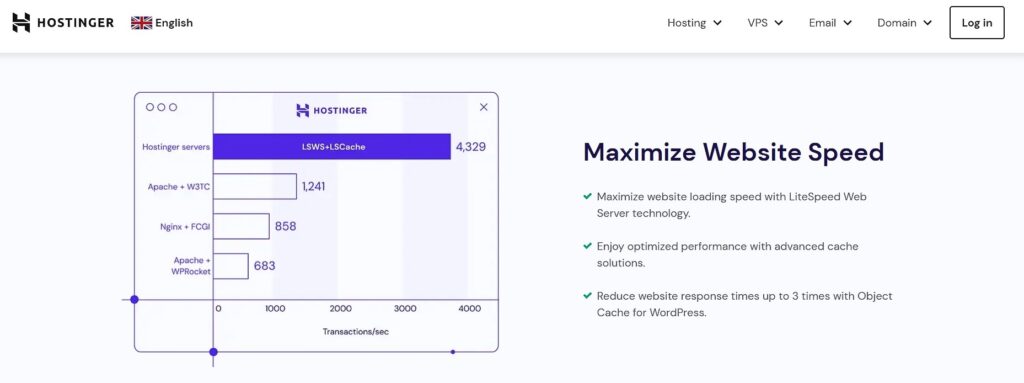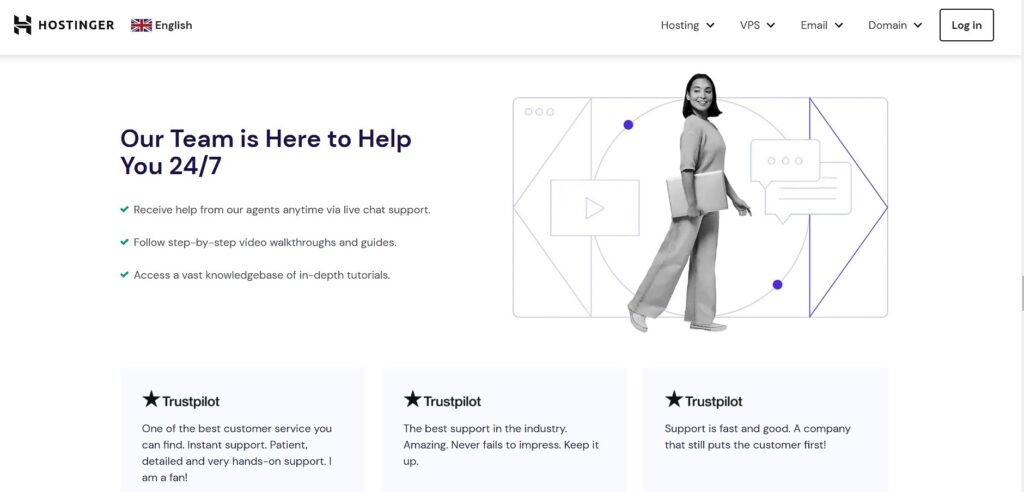Your website deserves a hosting platform that is built for speed, security, while being eco-friendly.

Introduction

In today’s digital landscape, having a fast, secure, and environmentally conscious web hosting service is crucial for the success of any online venture. In this article, we will delve into the importance of blazing fast web hosting, the need for secure web hosting solutions, and the benefits of embracing eco-friendly practices in web hosting.

Importance of Fast Web Hosting
In a fast-paced world, where attention spans are dwindling, having a website that loads quickly is paramount. Slow loading times can lead to a high bounce rate, negatively impacting user experience and search engine rankings. Blazing fast web hosting ensures optimal website performance, resulting in improved user satisfaction and higher conversion rates.

The Need for Secure Web Hosting
Website security is a top priority for businesses and individuals alike. With cyber threats on the rise, a secure web hosting environment becomes crucial to safeguard sensitive data and protect against malicious attacks. Secure web hosting solutions employ advanced security measures, including robust firewalls, regular backups, SSL certificates, and proactive monitoring, ensuring peace of mind for website owners.

Embracing Eco-friendly Web Hosting
In an era where environmental sustainability is a pressing concern, eco-friendly web hosting has gained significant traction. By opting for green hosting providers, businesses can minimize their carbon footprint and contribute to a cleaner planet. Eco-friendly web hosting utilizes renewable energy sources, energy-efficient infrastructure, and carbon offset programs to minimize the environmental impact of hosting services.

Understanding Blazing Fast Web Hosting
Blazing fast web hosting is characterized by lightning-fast page loading speeds, optimized server configurations, and efficient content delivery networks (CDNs). These hosting solutions leverage cutting-edge technologies such as solid-state drives (SSDs), caching mechanisms, and server-level optimizations to ensure rapid data retrieval and smooth user experiences.

Benefits of Blazing Fast Web Hosting
- Enhanced User Experience: With quick loading times, users can navigate seamlessly through web pages, improving engagement and reducing bounce rates.
- Improved SEO Rankings: Search engines prioritize fast-loading websites, resulting in higher organic rankings and increased visibility.
- Increased Conversions: Faster websites lead to higher conversion rates, as users are more likely to stay engaged and complete desired actions.
- Competitive Advantage: A blazing fast website sets you apart from competitors, showcasing your commitment to exceptional user experiences.
Exploring Secure Web Hosting Solutions
Secure web hosting solutions offer a range of features designed to protect websites from potential threats. These include:
- Robust Firewall Protection: A firewall acts as a barrier between your website and potential intruders, filtering out malicious traffic and unauthorized access attempts.
- Regular Backups: Scheduled backups ensure that website data can be restored in case of a security breach or accidental data loss.
- SSL Certificates: Secure Socket
Layer (SSL) certificates encrypt data transmission between a website and its visitors, ensuring secure communication and protecting sensitive information.
- Proactive Monitoring: Secure web hosting providers employ advanced monitoring systems to detect and mitigate potential security threats promptly.
- Malware Scanning and Removal: Regular malware scans and automated removal tools help eliminate malicious code from your website, keeping it secure and free from vulnerabilities.
Key Features of Secure Web Hosting
When choosing a secure web hosting service, look out for the following key features:
- Secure Data Centers: Reliable web hosts operate state-of-the-art data centers with strict security protocols, including surveillance systems, access controls, and redundant infrastructure.
- Secure Email Services: Secure web hosting often includes robust email solutions with spam filters, encryption options, and virus scanning to ensure safe communication.
- Secure File Transfer: Secure FTP (File Transfer Protocol) or SFTP (Secure File Transfer Protocol) allows encrypted and protected file transfers between your computer and the hosting server.
- Two-Factor Authentication (2FA): Implementing 2FA adds an extra layer of security to your hosting account by requiring a second verification step, such as a unique code sent to your mobile device.
- Regular Software Updates: Web hosts that prioritize security regularly update server software, including operating systems and applications, to address vulnerabilities and protect against emerging threats.
Going Green with Eco-friendly Web Hosting
Eco-friendly web hosting providers are committed to minimizing their environmental impact. They achieve this through the following practices:
- Renewable Energy: Green web hosts harness renewable energy sources like solar or wind power to power their data centers, reducing reliance on fossil fuels.
- Energy-efficient Infrastructure: These providers optimize their infrastructure by using energy-efficient servers, cooling systems, and power management techniques to reduce energy consumption.
- Carbon Offset Programs: Some eco-friendly hosts invest in carbon offset programs or participate in initiatives that neutralize their carbon emissions by supporting renewable energy projects or reforestation efforts.
Advantages of Eco-friendly Web Hosting
- Environmental Responsibility: By choosing eco-friendly web hosting, you contribute to reducing carbon emissions and promoting sustainable practices.
- Positive Brand Image: Showcasing your commitment to eco-consciousness can attract environmentally aware customers and enhance your brand reputation.
- Cost Savings: Many eco-friendly hosting providers offer cost-effective plans and incentives, helping you save money while supporting green initiatives.
- Regulatory Compliance: In some regions, businesses are required to comply with environmental regulations. Choosing eco-friendly hosting ensures you meet these obligations.
Choosing the Right Web Hosting Provider
When selecting a web hosting provider, consider the following factors:
- Reliability and Uptime: Look for providers that guarantee high uptime percentages and offer reliable server infrastructure to minimize website downtime.
- Scalability: Ensure your hosting plan allows for future growth and can accommodate increased website traffic and resource demands.
- Customer Support: Opt for a host with responsive customer support, available through multiple channels, to address any technical issues or concerns promptly.
- Pricing and Value: Compare hosting plans to find the right balance between cost, features, and performance. Consider any additional services included, such as domain registration or SSL certificates.
- User-Friendly Control Panel: A user-friendly control panel, such as cPanel or Plesk, simplifies website management, file uploads, email setup, and database administration.
Factors to Consider for a Sustainable Website
Building a sustainable website goes beyond hosting. Consider these factors:
- Website Optimization: Optimize images, minify code, and leverage caching techniques to reduce the size of web page files and improve loading times.
- Content Delivery Network (CDN): Utilize a CDN to distribute website content across multiple servers worldwide, reducing latency and enhancing performance
- Efficient Coding Practices: Follow best coding practices to ensure clean and optimized code, which improves website performance and reduces server load.
- Minimize Resource Usage: Optimize website elements such as scripts, plugins, and media files to minimize resource consumption and improve efficiency.
- Regular Updates and Maintenance: Keep your website’s software, themes, and plugins up to date to ensure optimal performance, security, and compatibility with the latest technologies.
- Content Management System (CMS) Selection: Choose a CMS that prioritizes performance and offers optimization features, such as caching plugins or built-in SEO tools.
- Sustainable Web Design: Adopt a minimalist design approach, use eco-friendly color schemes, and optimize images for web to reduce data transfer and improve loading times.
Conclusion
In conclusion, selecting a blazing fast, secure, and eco-friendly web hosting service is vital for the success of your website. Fast loading times enhance user experience, improve SEO rankings, and increase conversions. Secure hosting solutions protect your website from cyber threats and safeguard sensitive data. Embracing eco-friendly practices in web hosting minimizes your environmental impact and supports sustainability efforts. When choosing a web hosting provider, consider factors such as reliability, scalability, customer support, and value. Additionally, implement sustainable website practices like optimization, efficient coding, and regular maintenance to create a high-performing and eco-conscious online presence.
FAQs
1. Is blazing fast web hosting essential for all types of websites? Yes, fast loading times are crucial for all websites as they improve user experience, SEO rankings, and conversion rates.
2. How does secure web hosting protect my website? Secure web hosting employs advanced security measures such as firewalls, regular backups, SSL certificates, and proactive monitoring to safeguard your website from potential threats.
3. What are the advantages of eco-friendly web hosting? Eco-friendly web hosting reduces your carbon footprint, enhances your brand image, offers cost savings, and ensures compliance with environmental regulations.
4. How do I choose the right web hosting provider? Consider factors such as reliability, scalability, customer support, pricing, and user-friendly control panels when selecting a web hosting provider.
5. What can I do to make my website more sustainable? Optimize your website’s performance, minimize resource usage, keep software up to date, choose an eco-friendly CMS, and adopt sustainable web design practices.